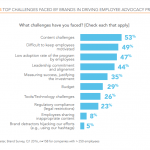How To Get Noticed By Your Company’s CEO
Ever find yourself alone in the elevator with the CEO, palms sweating and tongue-tied?
Apart from awkward elevator interactions, how can you catch the eye of the CEO in a way that will provide long-term opportunities for you, without railroading over your colleagues and superiors?
As a current CEO, preceded by many years as a non-CEO, I can tell you the answer is simpler than you might think. These five tips will definitely help. Just be careful not to take your efforts too far; overstepping your role could bring you the kind of attention you’re not looking for.
1. Just Introduce Yourself
Most CEOs I know welcome the opportunity to get acquainted with people at all levels of the organization. Be brief, specific, and positive in your introduction: “I don’t think we’ve met. I’m Joel, and I’ve been a clerk here for two months. I’m excited to be here.”
If you have met the CEO before, but you’re not sure he’ll be able to place your name or face, give him a bit of context and a topic to talk about: “Hi, I’m Amy from sales. I attended that quarterly review last month, in place of my boss, Stan Baldwin. I have to say, things really are looking up this quarter.”
You know you’ve gone too far when: You’re talking so rapidly that it takes a minute to register his response: “Okay, nice to meet you. You can let go of my hand now.” Also beware of over-introducing yourself or getting into creepy/stalker territory: “Hi, I’m Jonas. I’ve been here 10 years now. We sat next to each other at the sales conference last year? You ordered the halibut for dinner that night and spilled tartar sauce on your tie? Man, I loved the navy shoes you wore that night.”
2. Volunteer For Projects
CEOs tend to have far more ideas than they have people to execute on those ideas. If you’re in a meeting, and a project opportunity arises that happens to be in your wheelhouse, raise your hand. Volunteer. This is your chance to be seen by the CEO—to show some initiative and passion.
You know you’ve gone too far when: You’re a marketer volunteering to take on the balance sheet. Make sure you’re qualified to complete the task. Also, be careful not to over-volunteer to the point that you’re elbowing your colleagues out of the way. You don’t want to catch the CEO’s eye in a way that makes everyone else hate you.
3. Ask Your Manager For Help
If you have a good relationship with your direct manager, don’t hesitate to ask directly, “Hey, I’ve never had a chance to see our CEO in action. Could I attend an upcoming meeting or event with you? I’d like her to know who I am when opportunities come up.” Most managers who are secure in their own positions will have no problem with that.
You know you’ve gone too far when: Your manager thinks you’re trying to leapfrog over her. Remember, your boss has the same need to be noticed and valued by the CEO as you do, so never try to make gains at her expense. And be mindful of your proper place when you’re in that coveted meeting. If you usurp all the attention and your manager fades into the background, she’s not likely to invite you again.
4. Don’t Overstep Your Bounds
Catching the CEO’s eye can be a great boost for your professional goals, as long as you’re not noticed for the wrong reasons. Respect hierarchy and company protocols. Don’t breeze into the CEO’s office unannounced for a spontaneous chat: “Hey, man! How’s it going?” Don’t be the one who’s always doing all the talking—jumping in to answer every question, repeating other people’s points just to have something to say.
You know you’ve gone too far when: The CEO ignores your raised hand and asks, “Does anyone else have an opinion on this topic?” It’s also a bad sign if she sees you in the hallway, freezes, makes an abrupt about face, ducks back into her office, and doesn’t answer the door when you knock.
5. Learn To Write And Present
No matter what your functional area of expertise may be, learning to write well and confidently present your ideas will set you apart. These two skills are essential for those who aim to climb the corporate ladder. Your CEO may sit through a half-dozen or more presentations every week. If you’re more articulate, prepared, thoughtful, humorous, and/or convincing than the average PowerPoint narrator, the CEO will remember you.
Likewise, if you’re ever asked to write a report or status update to send to the CEO, you’ll get bonus points for expressing yourself clearly, concisely, and coherently. Don’t use this opportunity to show off your vocabulary or your deep knowledge of company history. Be brief and be gone.
You know you’ve gone too far when: When it comes to writing and presenting, you really can’t ever be too good, too engaging, too polished.
If you’ll continually work to improve your written and verbal skills, take advantage of opportunities as they arise, and keep these other tips and cautions in mind throughout your career, you may just find yourself on the path to promotion.
Joe Staples is CMO of Workfront, provider of work and project management software for marketers. Follow him on Twitter at @jstaples21.
Fast Company , Read Full Story
(14)














